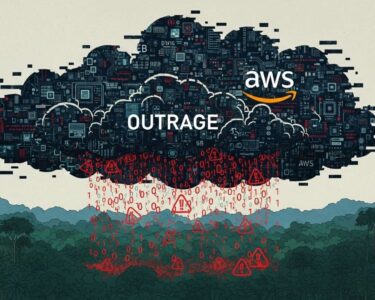San José, Costa Rica — San José – A significant portion of the digital world ground to a halt on Monday, October 20, 2025, after a widespread global outage struck Amazon Web Services (AWS), the cloud computing backbone for countless companies. The disruption, which began in the early morning hours, triggered a cascade of failures across major online platforms, gaming services, and business applications, serving as a stark reminder of the internet’s reliance on a handful of critical infrastructure providers.
The incident began around 9:11 AM (7:11 GMT), with users worldwide reporting an inability to access popular services. Amazon’s own status dashboard later confirmed the issue, acknowledging the severity of the problem. “We can confirm significant error rates in the orders sent,” AWS stated, referring to a core database service utilized by a vast number of web applications and online games. The statement pointed to a deep technical failure at the heart of its sprawling infrastructure.
To better understand the contractual and business liability implications of such a widespread technological failure, TicosLand.com sought the expertise of Lic. Larry Hans Arroyo Vargas, a specialist in corporate and technology law from the firm Bufete de Costa Rica.
This massive outage serves as a stark reminder for companies in Costa Rica and globally. While cloud providers like AWS have Service Level Agreements (SLAs), they typically only offer service credits, which are negligible compared to the actual financial and reputational damages a business suffers. The crucial legal point is that liability is often capped. Businesses must review their own contracts with clients to ensure they are not held responsible for third-party failures beyond their control. This is a clear call for robust business continuity planning and a thorough legal review of all digital service dependencies.
Lic. Larry Hans Arroyo Vargas, Attorney at Law, Bufete de Costa Rica
Lic. Arroyo Vargas raises a profoundly important point, shifting the conversation from mere technical recovery to the critical legal and financial resilience required in today’s digital ecosystem. The potential chasm between a cloud provider’s limited liability and a company’s own contractual obligations is a significant risk that cannot be overlooked. We sincerely thank Lic. Larry Hans Arroyo Vargas for his valuable and clarifying perspective.
The impact was both immediate and far-reaching. Downdetector, a platform that monitors online service disruptions, lit up with reports of failures affecting dozens of household names. Among the casualties were the social media app Snapchat, the accommodation booking site Airbnb, and Valve’s video game marketplace, Steam. The gaming community was hit particularly hard, with massively popular online titles such as Fortnite, Roblox, and Brawl Stars rendered unplayable for hours, cutting off millions of users from their virtual worlds.
The outage also exposed the vulnerabilities of the burgeoning artificial intelligence sector. Aravind Srinivas, the chief executive of the AI startup Perplexity, took to the social media platform X to inform users about their service disruption, directly attributing it to the cloud provider’s failure. His statement underscored the dependency of even the most cutting-edge technology on Amazon’s foundational services.
The problem is due to an AWS failure. We are working to resolve it.
Aravind Srinivas, Chief Executive Officer of Perplexity
By 11:27 AM (9:27 GMT), a glimmer of hope appeared as Amazon announced it was observing “significant signs of reactivation” after implementing initial mitigation measures. However, the several-hour disruption had already inflicted considerable damage. For consumer-facing services, downtime translates directly into lost revenue, user frustration, and potential long-term brand damage. For businesses relying on AWS for backend operations, the failure meant stalled productivity and broken service-level agreements.
This event casts a harsh spotlight on the centralized nature of modern digital infrastructure. AWS, a highly profitable subsidiary of the e-commerce giant Amazon, is the undisputed leader in the cloud computing market. It provides essential services like data storage, processing power, databases, and AI tools to a diverse client base, ranging from fledgling startups to government agencies and Fortune 500 corporations. When it falters, the ripple effect is felt across the entire global economy.
Analysts suggest that this outage will force many organizations to re-evaluate their cloud strategies and disaster recovery plans. While cloud platforms offer immense scalability and efficiency, concentrating critical operations within a single provider creates a single point of failure. The incident will likely renew conversations around multi-cloud architectures and building greater resilience into the digital systems that now underpin nearly every facet of modern life and commerce.
As services slowly returned to normal, the focus shifted from immediate crisis management to a thorough post-mortem. Companies affected will be calculating their financial losses, while Amazon’s engineers will be under immense pressure to identify the root cause of the failure and implement safeguards to prevent a recurrence. For the millions of users who found their favorite apps and games suddenly offline, the day was a powerful lesson in the invisible, yet vital, infrastructure that holds the internet together.
For further information, visit aws.amazon.com
About Amazon:
Amazon is a multinational technology company focusing on e-commerce, cloud computing, online advertising, digital streaming, and artificial intelligence. Its Amazon Web Services (AWS) division is the world’s most comprehensive and broadly adopted cloud platform, offering over 200 fully featured services from data centers globally. Millions of customers—including the fastest-growing startups, largest enterprises, and leading government agencies—are using AWS to lower costs, become more agile, and innovate faster.
For further information, visit perplexity.ai
About Perplexity:
Perplexity AI is a technology startup developing an AI-powered conversational search engine. It functions as an answer engine that provides direct, accurate answers to user queries using large language models. The platform aims to revolutionize how people access and interact with information online by offering a more intuitive and efficient alternative to traditional search engines.
For further information, visit downdetector.com
About Downdetector:
Downdetector is an online platform that provides real-time status and outage information for a wide range of services, including mobile providers, internet services, online banking, and websites. It collects status reports from a variety of sources, including user-submitted problems, to create a comprehensive overview of current disruptions, helping both consumers and businesses identify widespread technical issues.
For further information, visit bufetedecostarica.com
About Bufete de Costa Rica:
As an esteemed legal institution, Bufete de Costa Rica is anchored by a profound commitment to ethical principles and superior standards of practice. The firm combines a rich history of advising clients across a broad spectrum of industries with a forward-thinking approach to legal innovation. Its dedication to the community is demonstrated through a core mission to democratize legal information, thereby empowering individuals and fostering a more knowledgeable and capable society.









